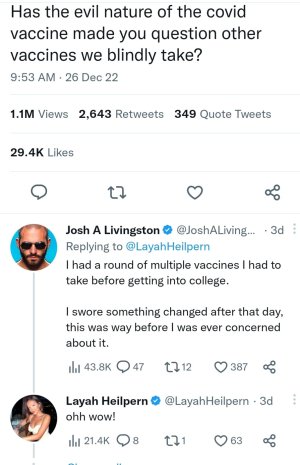Statistics are simply puzzle pieces - everyone may have a different picture and using them differently.
I personally don’t agree at all with the statistics you are using. And i also agree that the statistics I use are not right for you. It’s only normal for us to internally feel a certain way and find statistics that support that feeling. Human nature.
I’m scared of what is out there. I deal with it by telling myself it’s not that bad and trying to find statistics that support that. I don’t like feeling helpless against something like this. And I do feel that fear is more dangerous than this virus. I’m very afraid of us as humans losing our connection with the natural order of life. Death is normal and to be expected. We’ve gone so far to try and inoculate ourselves against it that we’ve paralyzed ourselves with fear. And this is not just corona related but it’s became a way of life for societies in general. Embracing uncertainty has seemed to become lost from our spirit.
Back from my tangent. The statistics I find (and others can disagree) most compelling are the ones based on cruise ship data. It’s very interesting because they get tested multiple times, they can’t leave, and they were all exposed to it heavily.
Diamond Princess
3,711 passengers and crew
700 infected (got corona)
126 asymptomatic of the 700 (means they had it but didn’t show symptoms)
3,000+ tests performed
7 died
In a cruise ship environment all 3,711 can assume to have been exposed to it. From my reading of the data that means .189% (much less than 1%) of people die (7/3,711).
Additionally, given that cruise ship populations tend to err more toward the older side I would infer that among the regular population the percentage that are asymptomatic is 25%+ and that the death rate is lower.
As such, my hypothesis (and that’s all it is) is (based on 1,000 people)
1. If exposed to it of the 1,000 about 175 people would become carriers of the virus
2. Of those 175 people
25 would show no symptoms
150 would show symptoms
3. Of the 175 people that have it:
1-2 would die
If we extrapolate that to the entire US population of 330 million people my hypothesis is that if everyone were exposed then 500,000 to 1,00,000 people would die if absolutely zero social distancing was done or precautions taken.
The harder question is the moral one - what is the right number to restart the country and world. At what point do people dying of hunger, debt, stress, suicide, mental health, falling into severe poverty or homelessness etc outweigh a life saved? Everyone deep down will have their own answer. And individually that answer is and probably should be different than what a country does objectively.
Here is a link to the article:
Close confines help the virus to spread, but closed environments are also an ideal place to study how the new coronavirus behaves.

www.nature.com






































